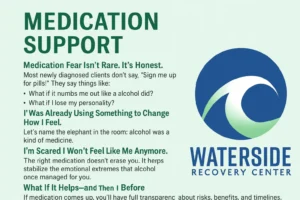Even if nobody says it out loud, there’s a quiet shame in falling off halfway. Ghosting your IOP. Missing one week, then another. Telling yourself maybe it wasn’t helping anyway. You stop replying to the check-in texts. You avoid your sponsor’s number. And before you know it, you’re back to drinking like nothing ever happened.
But here’s the thing—drinking doesn’t get to be your whole story. Not now. Not ever.
This isn’t about rewriting your past. It’s about picking up where you left off. If alcohol addiction treatment felt too hard to stick with the first time, you’re not alone—and you’re not disqualified. The story doesn’t end because you paused the plot.
Alcohol addiction treatment at Waterside Recovery meets you where you are. Whether that’s your second try, fifth, or you’re still deciding what to do next—we’ve left the light on for you.
You’re Allowed to Come Back—Even If You Ghosted
One of the biggest myths people believe about treatment is that if you leave, you can’t come back. Or worse—that you have to earn your way back.
But at Waterside Recovery in Plymouth County, MA, there’s no gatekeeping. No long explanation needed. Just you, showing up again—however imperfectly.
You don’t need a rock bottom story or a perfect “why now” speech. If you’re thinking about coming back, that’s reason enough.
It Feels Different the Second (or Fifth) Time Around
A lot of people worry that trying again will feel like failure. That they’ll be stuck back at square one. But returning to alcohol addiction treatment actually gives you something most first-timers don’t have: perspective.
You already know what parts felt good. What felt hard. What helped (and what didn’t).
“The first time, I didn’t say much in group. I thought if I just did the homework and showed up, I’d be fine. When I came back, I actually opened my mouth. And that’s when it started to shift.”
– Former IOP Client
It’s not about being “more ready.” It’s about being more real. The version of you walking back into treatment knows a little more about yourself. And that counts for a lot.
Drinking Might Be Loud, But It’s Not the Only Voice You Have
When you’ve been drinking for a while—especially after stopping for a bit—it can start to feel like alcohol is narrating everything.
You feel anxious: drink.
You mess up: drink.
You want to celebrate: drink.
You’re bored, lonely, overwhelmed: drink.
It becomes the soundtrack. The narrator. The fallback. Until suddenly, it feels like the only story you know how to tell.
But here’s the truth: that’s not you. That’s your coping strategy. And treatment isn’t about stripping that away and leaving you exposed—it’s about helping you build a new voice that actually sounds like you.
Ghosting Isn’t a Character Flaw—It’s a Coping Response
Leaving mid-treatment isn’t about laziness. It’s about survival. When treatment starts to touch the things you’ve buried—shame, trauma, loneliness, grief—it can feel unbearable.
So you do what your nervous system tells you: get out. Go quiet. Protect yourself.
But that doesn’t make you broken. It makes you human. And if you return with that understanding, treatment can start from a gentler, wiser place.
At Waterside Recovery, we get it. We won’t ask, “Why did you leave?” We’ll ask, “What do you need now?”
The Open Door Is Real—And It Stays Open
If you’re in Plymouth County or nearby in Bristol County, MA, you have options. We design alcohol addiction treatment with flexibility and reality in mind.
That means:
- Evening IOP for those who work during the day
- Virtual sessions if driving feels like a barrier
- Case managers who know how to meet people in the messy middle, not just the rock bottom
The door doesn’t close because you ghosted. The welcome mat stays rolled out.

Re-Entry Can Feel Awkward—Do It Anyway
One of the hardest parts about coming back to treatment isn’t logistics—it’s shame.
You think:
“They’ll judge me.”
“They probably think I never cared.”
“I already blew my shot.”
But the truth? Most of the people in treatment have been there. Staff included. One therapist at Waterside said:
“We don’t see dropouts as failures. We see them as people still fighting for their story.”
If you’re still here, still thinking about this, you’re still in the game.
Quick Tips for Re-Engaging With Treatment
Take One Step, Not Ten
You don’t have to commit to the whole program today. Just call. Just ask questions. Just poke your head back in.
Say the Awkward Thing Out Loud
“Yeah, I ghosted.” “I started drinking again.” “I wasn’t ready.” Whatever it is—it won’t shock anyone. Saying it out loud lets it breathe.
Let Yourself Feel Weird
Re-entry is strange. You might feel like the new kid again, even if you’ve been here before. That’s okay. Keep showing up.
Expect Resistance
There will be part of you that wants to quit again. That’s not a sign you should. It’s just your fear talking.
Don’t Wait for Perfect Timing
There’s no ideal mood, day, or life situation that makes treatment easier. If you’re thinking about it now, it matters now.
Why Treatment Is Still Worth It—Even If You’ve Done It Before
Maybe you didn’t finish the last program. Maybe you felt disconnected. Maybe you relapsed right after discharge. That doesn’t mean treatment can’t work.
It just means you need a version of care that fits you better this time.
Here’s what “better fit” can look like:
- A therapist who actually gets your sarcasm and resistance
- Group members you feel safe around
- A treatment plan that includes your depression, not just your drinking
- Staff who treat you like a person, not a problem
Your Recovery Story Is Still Being Written
You don’t have to reclaim your whole life today. You just have to pick up the pen again.
Whether that means rejoining IOP, starting individual therapy, or even just exploring options—you’re allowed to begin again.
We see people walk back through our doors all the time. Some stay longer. Some leave again. Some come back three times before it sticks.
And every single one of them deserves to be there.
Frequently Asked Questions About Re-Entering Alcohol Addiction Treatment
Do I have to start all over if I return to treatment?
Not necessarily. Programs like the one at Waterside Recovery often build on what you’ve already done. You won’t be treated like a beginner if you’re not one. Your care team will meet you where you are.
Will the program judge me for leaving or relapsing?
Absolutely not. Relapse and disengagement are common in recovery. We treat returning clients with the same care and respect as those attending for the first time—sometimes more, because we know how hard it is to come back.
What if I can’t attend every session this time around?
We offer flexible options, including virtual sessions and evening groups. Life is messy, and your treatment should make room for that. Let us know your barriers—we’ll help you navigate them.
Is alcohol addiction treatment confidential?
Yes. Everything you share is protected by law and by ethics. Whether you’ve been here before or are returning after time away, your privacy is a top priority.
Can I re-enter treatment if I’m still drinking?
Yes. You don’t need to be sober to start. You just need to be willing to try. We’ll help you take the steps to reduce use safely, without shame or pressure.
You’re Not Starting Over. You’re Starting Different.
If alcohol has been the loudest part of your story lately, that doesn’t mean it’s the only part. You’re still here. You’re still thinking. You’re still fighting—whether quietly or out loud.
Let us help you find your next sentence.
Call (866)671-8620 or visit our Alcohol Addiction Treatment in Plymouth County, MA Page. Your seat is still here. You are still welcome. Let’s begin again.


